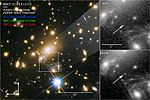K2-146b
Appearance
 Size comparison of the planet K2-146b (artistic concept) with Earth | |
| Discovery | |
|---|---|
| Discovery site | Kepler Space Observatory |
| Transit | |
| Orbital characteristics | |
| Star | K2-146 |
K2-146b is a Neptune-like exoplanet discovered in 2018 by the Kepler Space Telescope that orbits a low-mass M-type star in the constellation Cancer.[1][2] Its host star, K2-146, is orbited by another planet named K2-146c.[3] The planet orbits K2-146 at a distance of 0.0248 AU (3,710,000 km),[3] fifteen times closer than Mercury is to the Sun (0.3871 AU[4]). Thus, it orbits very rapidly, with one year lasting just 2.64 days (63 hours),[5] and is far too hot to be habitable, with an equilibrium temperature of 534 K (261 °C; 502 °F).[6]
References
[edit]- ^ "K2-146 b". Exoplanets Exploration. 2018.
- ^ Lazaro, Enrico (March 13, 2018). "Kepler Finds Twelve Exoplanets around Low-Mass Stars". Sci-News.com.
- ^ a b Lam, Kristine W. F.; et al. (2020-03-01). "It Takes Two Planets in Resonance to Tango around K2-146". The Astronomical Journal. 159 (3): 120. arXiv:1907.11141. doi:10.3847/1538-3881/ab66c9. ISSN 0004-6256.
- ^ Williams, D.R. "Mercury Fact Sheet". NASA Goddard Space Flight Center. Retrieved 2024-08-02.
{{cite web}}: CS1 maint: url-status (link) - ^ Hamann, Aaron; Montet, Benjamin T.; Fabrycky, Daniel C.; Agol, Eric; Kruse, Ethan (2019-09-01). "K2-146: Discovery of Planet c, Precise Masses from Transit Timing, and Observed Precession". The Astronomical Journal. 158 (3): 133. arXiv:1907.10620. doi:10.3847/1538-3881/ab32e3. ISSN 0004-6256.
- ^ Livingston, John H.; et al. (2018-12-01). "Sixty Validated Planets from K2 Campaigns 5–8". The Astronomical Journal. 156 (6): 277. arXiv:1810.04074. doi:10.3847/1538-3881/aae778. ISSN 0004-6256.


